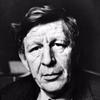Writer / Poet
Professional
Channels and Networks

W H Auden's (Wystan Hugh Auden) poetry was noted for its stylistic and technical achievement, he was a prolific writer of prose essays and reviews on literary, political, psychological, and religious subjects, and he worked at various times on documentary films, poetic plays, and other forms of performance.
A poet is, before anything else, a person who is passionately in love with language.
A poet must never make a statement simply because it is sounds poetically exciting; he must also believe it to be true.
Auden began writing poems in 1922, at fifteen, mostly in the styles of 19th-century romantic poets, especially Wordsworth, and later poets with rural interests, especially Thomas Hardy. At eighteen he discovered T. S. Eliot and adopted an extreme version of Eliot's style.
A poem is a verbal artifact which must be as skillfully and solidly constructed as a table or a motorcycle.
He published about four hundred poems, including seven long poems (two of them book-length). He also wrote more than four hundred essays and reviews about literature, history, politics, music, religion, and many other subjects.
The eye likes novelty, but the ear craves familiarity. The ear tends to be lazy, craves the familiar and is shocked by the unexpected; the eye, on the other hand, tends to be impatient, craves the novel and is bored by repetition.
He came to wide public attention with his first book Poems at the age of twenty-three in 1930, this was followed in 1932 by The Orators.
Poetry is the only art people haven't learned to consume like soup.
He won the Pulitzer Prize for Poetry in 1947 for his long poem The Age of Anxiety, the title of which became a popular phrase describing the modern era.
A craftsman knows in advance what the finished result will be, while the artist knows only what it will be when he has finished it.
From 1956 to 1961 he was Professor of Poetry at Oxford - his lectures were popular with both students and faculty and served as the basis for his 1962 prose collection The Dyer's Hand.
There must always be two kinds of art: escape-art, for man needs escape as he needs food and deep sleep, and parable-art, that art which shall teach man to unlearn hatred and learn love.
After his death, his poems became known to a much wider public than during his lifetime through films, broadcasts, and popular media.
To learn more about W H Auden click and explore any of his media channels and network links in the tool-bar above.



